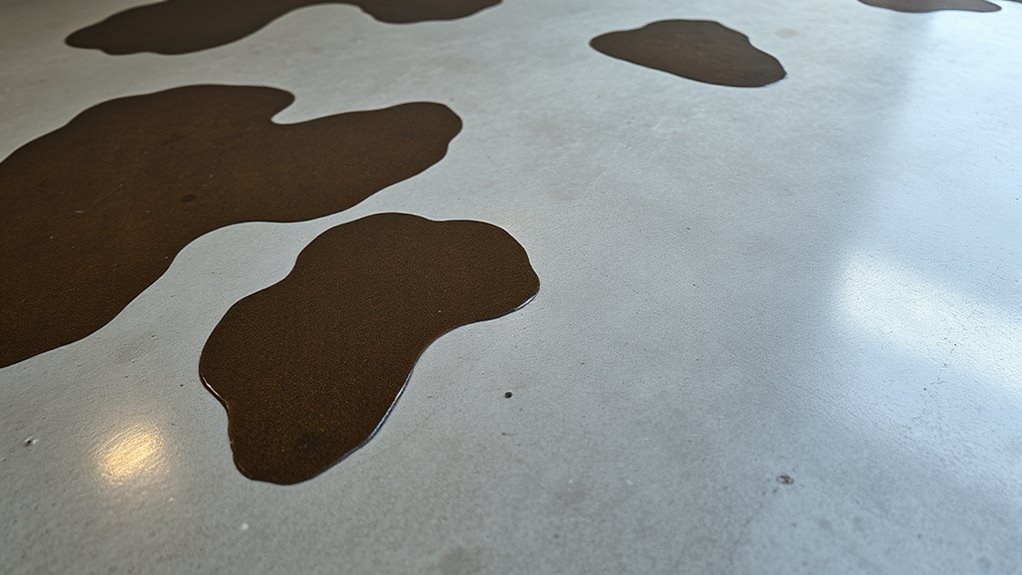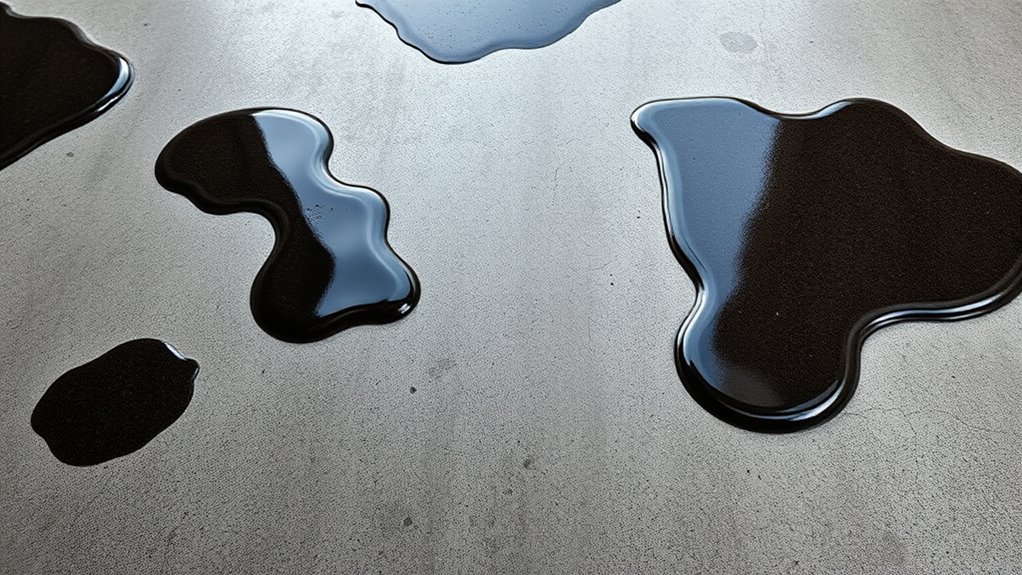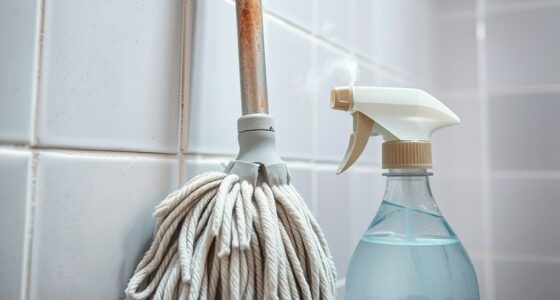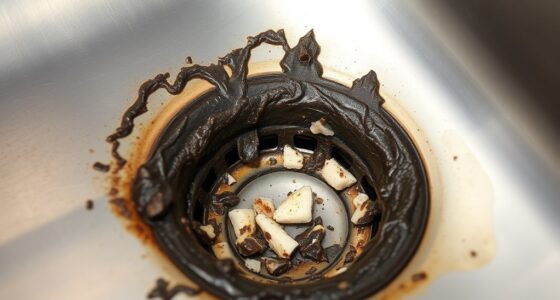To lift oil stains without etching your garage floor, start by blotting spills immediately with paper towels or old rags. Apply a baking soda paste, letting it sit for 15-30 minutes, then scrub gently with a stiff brush. For tougher stains, use a commercial concrete degreaser following the manufacturer’s instructions carefully. Regularly sealing your concrete can prevent future stains. If you want to learn more effective tips and tricks, keep exploring your options.
Key Takeaways
- Blot fresh oil spills immediately to prevent deep absorption into the concrete.
- Use a baking soda paste to lift oil stains gently without damaging the surface.
- Apply commercial degreasers designed for concrete, following manufacturer instructions carefully.
- Seal the garage floor to reduce porosity and prevent future oil stains from setting in.
- Regularly clean and maintain the floor with natural or chemical solutions to avoid etching or permanent stains.

Oil stains on your garage floor can be frustrating, but they’re a common problem that you can effectively tackle. The key is knowing the right cleaning techniques to lift these stubborn stains without causing damage to your concrete. Instead of resorting to harsh chemicals or etching methods, focus on gentle, effective solutions that prevent future stains while removing existing ones. Proper stain prevention starts with understanding how oil seeps into the porous surface of your garage floor, making early intervention essential. The moment you notice a spill, act quickly to minimize absorption, which will make cleaning easier and more successful.
To begin, blot up as much excess oil as possible with paper towels or old rags. Avoid wiping or spreading the stain further. Once you’ve removed the initial spill, you can apply a cleaning solution designed for oil stains. A popular and effective option is a paste made from baking soda and a small amount of water. Spread it over the stain, letting it sit for 15 to 30 minutes, then scrub gently with a stiff-bristled brush. This method works well because baking soda is an absorbent that lifts oil without damaging your concrete. For tougher stains, commercial degreasers formulated for concrete can be used, but always follow the manufacturer’s instructions and test in a small area first.
Additionally, integrating robotic automation into maintenance routines can help ensure regular inspections and prompt spill response, reducing the likelihood of permanent stains. Prevention is your best defense against future stains. Applying a concrete sealer can markedly reduce porosity, preventing oil from soaking in and making stains easier to clean. Regularly inspecting your garage for leaks and addressing them promptly also helps. Keep your garage organized so that spills are less likely to spread or go unnoticed. Using mats or drip trays under vehicles can catch leaks before they hit the floor, extending the life of your concrete surface and keeping it looking clean.
Frequently Asked Questions
Can Oil Stains Be Removed From Sealed Garage Floors?
Yes, you can remove oil stains from a sealed surface. Since the sealant prevents oil penetration, cleaning is easier. First, use a degreaser or a mixture of dish soap and warm water to loosen the stain. Scrub gently with a brush, then rinse thoroughly. For stubborn stains, apply a commercial oil remover designed for sealed surfaces. Always test a small area first to avoid damaging the sealant.
Are There Eco-Friendly Methods to Lift Oil Stains?
Yes, you can use eco-friendly methods like biodegradable cleaners and natural remedies to lift oil stains. Try mixing baking soda and dish soap into a paste, then applying it to the stain and scrubbing gently. Alternatively, sprinkle cornstarch or sawdust on the oil, let it absorb, then sweep away. These natural solutions are safe for the environment and effective at breaking down oil without damaging your sealed garage floor.
How Long Should I Wait Before Attempting to Remove Fresh Oil Stains?
You should wait at least 30 minutes before trying to remove a fresh oil stain, giving it time to set like a stubborn guest who refuses to leave. Rushing in too soon only risks embedding the stain further, making it harder to lift later. Patience is key—allow the waiting period to pass, so you can tackle the stain effectively without etching or damaging your garage floor.
Will Using Household Products Damage My Garage Floor?
Using household products for garage maintenance generally won’t damage your garage floor if you choose the right cleaning supplies. Avoid harsh chemicals like bleach or ammonia, which can cause discoloration or deterioration. Instead, opt for mild soaps, baking soda, or vinegar. Always test a small area first. Proper cleaning and gentle solutions help lift stains without etching or harming your concrete surface, keeping your garage looking clean and well-maintained.
Is Professional Cleaning Necessary for Stubborn Oil Stains?
When stubborn oil stains cling like shadows on your garage floor, DIY techniques might not be enough. You’ll see the stain stubbornly lingering despite your efforts. In such cases, commercial services are your best bet—they have specialized tools and solutions that cut through the grime. While DIY methods work for light stains, professional cleaning guarantees deep, thorough removal, leaving your floor spotless without risking damage or incomplete results.
Conclusion
Now that you know how to lift those stubborn oil stains without damaging your garage floor, imagine the transformation. Picture your garage spotless, the stains gone, and your space looking fresh and inviting. But beware—some stains may hide deeper than they appear, waiting to resurface when you least expect it. Will your next cleaning session reveal a flawless floor or a stubborn remnant? Keep your tools ready—victory might be just one treatment away.









